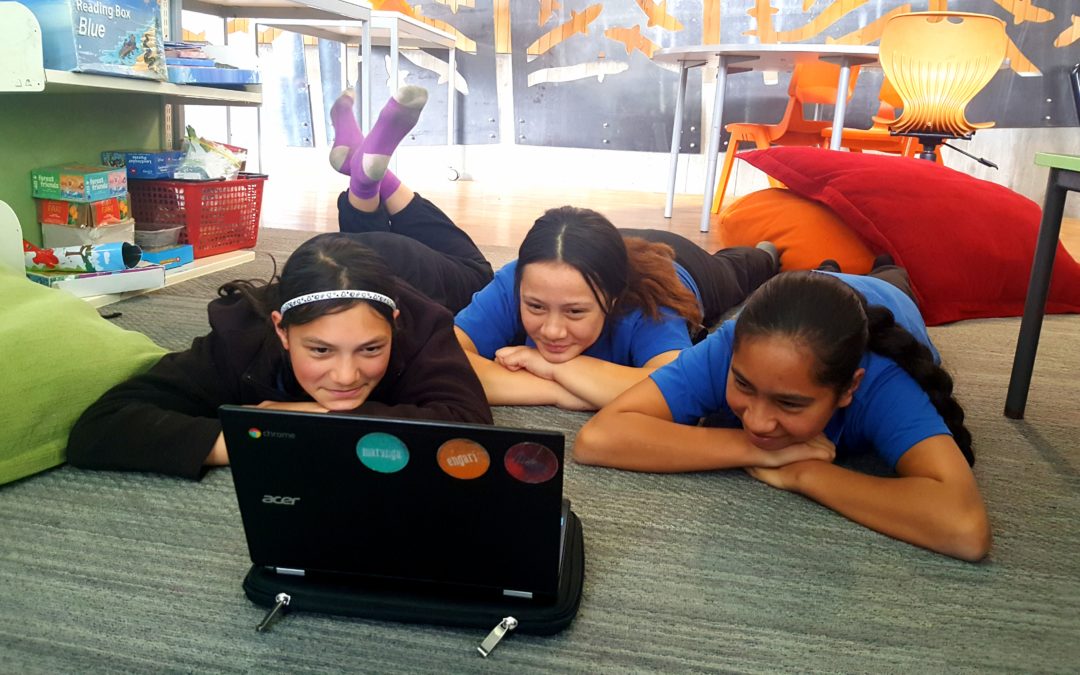Students at Murupara Area school can now watch online tutorials and access classwork from home, thanks to the many partners helping the school extend the Managed Network into homes without internet access.
Students at Murupara Area School are the latest to benefit from a pilot to extend N4L’s filtered school internet services into their homes for learning.
The “Murupara Connectivity” initiative is led by the local community trust, Te Aka Toitū Trust and will provide up to 160 homes connectivity to the school’s network so they can access their assignments and pursue learning interests after school hours.
An estimated 40 per cent of households in Murupara do not have internet access, according to Statistics New Zealand. The rural school lies in an area where there are few local jobs, with the closest urban centre being around an hour away, in Rotorua.
As with the other two pilots in Christchurch and Lower Hutt, N4L’s role is to ensure the students can login to the Managed Network from their homes, and access the same environment as they do at school.
This means that only websites meeting the school’s approved filtering criteria can be accessed from the home, so games like Fortnite and social media sites are ruled out. The Trust’s leaflet sent to the students’ families explains the use of a login and password will enable their children “to go online to revise school lessons, complete research, type up reports and much more.”
Murupara Area School principal, Dr Angela Sharples says “It means they are able to do homework online and email it to their teachers all in the safety of filtered internet. Not only does home internet allow access to school work after hours, it also means they can explore what they are passionate about and involve their families with their learning.”
She says the kids living without home internet do not have the same access to learning as students who can connect from home before and after school. Dr Sharples explains the school works in partnership with whanau, the marae and local Iwi to ensure the educational success of their tamariki.
Formed by a group of decile one and two principals of rural schools in the Eastern Bay of Plenty area, the Te Aka Toitū Trust is tapping into a number of commercial, government and charitable organisations to bridge the digital divide in their area.
Their goal is to make use of the technology available within the school to provide students with internet connectivity, an affordable device and quality digital learning that is accessible anywhere anytime at any pace. The first stage of the rollout began in Murupara in April 2019, and the second half of the year, the Trust will look at how they can address the challenge in Kawerau, a rural area, situated 53km east from Roturua.
Watch Keld Hunia, Project Manager of Keld Hunia, Project Manager, Te Aka Toitū Trust, talk about the Murupara Connectivity initiative in this 3min video produced by the NZ Herald’s Local Focus team.
The initiative is part of the Ministry of Education’s Equitable Digital Access For Students programme to work with community trusts, schools, telco companies and N4L to help co-create ways to help students without home internet access.
The organisations partnering with Te Aka Toitū vision to life are listed on its website, and include the area’s internet service provider, Wifi Connect, which are installing wireless devices on the roofs of students homes. The devices, which look similar to a small satellite dish, receive the school’s internet signal via special ‘repeater towers’ installed in the neighbouring hills that extend the internet signal to the home.
N4L’s Larrie Moore says: “The Te Aka Toitū Trust is doing a fantastic job of bringing everyone together to address a very important issue for our young people. We are delighted to be playing a small role in this, working closely with our government and technology partners to trial new ways students can access the Managed Network.
“For us, it’s about providing smart and safe equitable digital student access to learning where and when it’s needed.”
A recent school survey conducted by N4L found just over half of schools (52%) say that 25% or more of their students don’t have internet access at home. There was a notable difference for students attending lower decile schools, with over 85% of decile 1-3 schools reporting 25% are without home internet access. Schools commented these students are more likely to be left behind or under-served.

